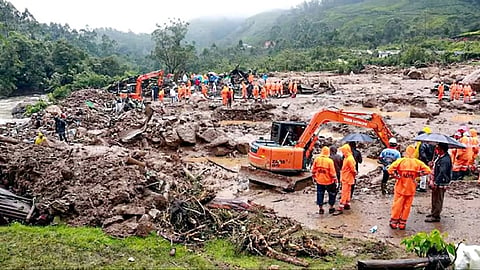

Wayanad (Kerala) | After the devastating landslides that hit the hilly Wayanad district of Kerala on July 30, an unprecedented waste management operation is underway setting a model for the country with the process being seamlessly integrated into the ongoing rescue operations.
The Suchitwa Mission, Clean Kerala Company and dedicated workers including thousands of Haritha Karma Sena members and others under the state Local Self- Government Department (LSGD) have so far removed 81.64 tonnes of solid waste and 106.35 kilolitres of toilet waste.
State LSGD Minister M B Rajesh said around 2,850 people including Haritha Karama Sena workers, officials and volunteers have participated in the clean-up so far.
Rajesh said the government has effectively intervened in the waste management and resolved the garbage issues in the landslide area and the relief camps.
"Effective garbage collection and disposal in landslide-hit areas and relief camps has helped Kerala set a new precedent in waste management in disaster zones," Rajesh said.
The Minister said the solid waste consists of 10.6 tonnes of biodegradable waste, 49.47 tonnes of non-biodegradable waste which include plastics, 0.3 tonnes of sanitary waste, 2.64 tonnes of biomedical waste, and 18.63 tonnes of textile waste.
The LSGD has been engaged in scientific disposal of biodegradable and non-biodegradable waste, toilet waste, management of sanitary and bio-medical waste by effectively complying with the Green protocols, Rajesh said.
He also said cleaning drives are organised in the disaster-hit area and relief camps in which 150 volunteers participate.
The LSGD has been using windrow compost units of the Kalpetta Municipality to process the organic waste from relief camps.
It has also been handing over the waste to three licenced swine farmers.
Two vehicles are being used for collecting biodegradable waste and around 50 Haritha Karma Sena volunteers are handling the same everyday.
Rajesh said in order to process the solid biodegradable waste, a 100kg-capacity compost tank was constructed near the camps.
The minister said 46 bio-toilets were installed in the disaster-hit regions of Mundakkai and Chooralmala for rescue workers.
"Till now, 106.35 kiloliters of toilet waste was scientifically processed using Faecal Sludge Treatment Plant (FSTP) of the Kalpetta Municipality and two septage treatment units," Rajesh said.
The bio-toilets are cleaned by the volunteers every two hours, he added.
Meanwhile, the sanitary waste including napkins and diapers are being collected in chlorine-free yellow covers.
He further said that community incinerators and double chamber incinerators have been installed in the relief camps for scientific disposal of sanitary waste.
Around 2.64 tonnes of bio-medical waste and 18.63 tonnes of textile waste were also scientifically disposed of by the LSGD, he said.
As many as 226 people have lost their lives and over 130 remain missing in one of the worst calamities to have struck Kerala in the early hours of July 30.
